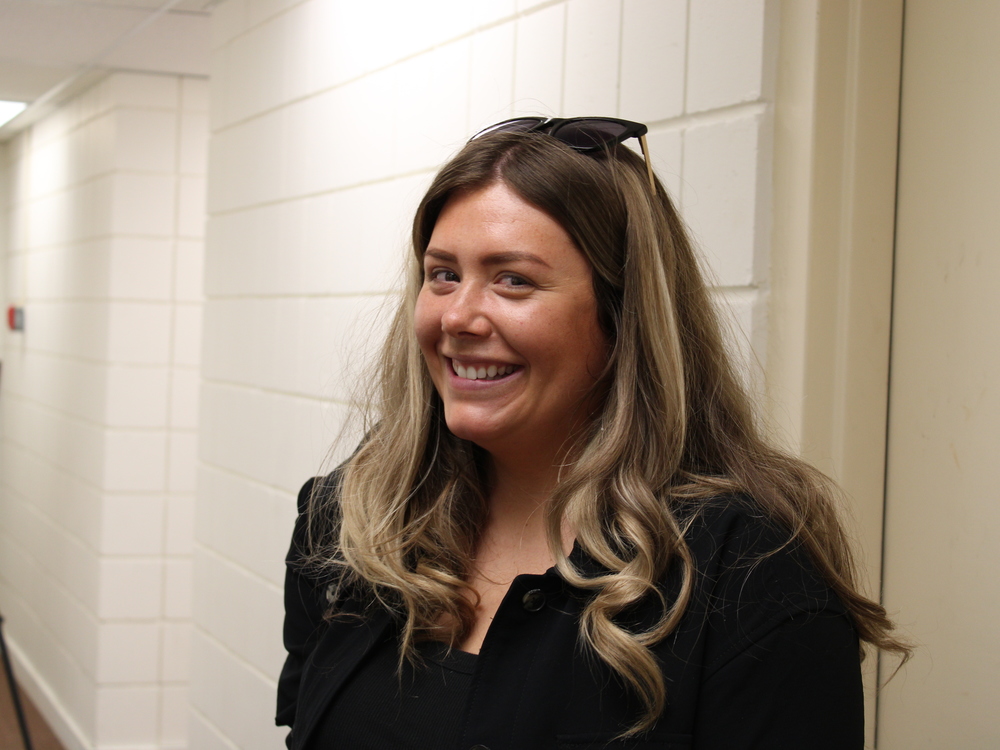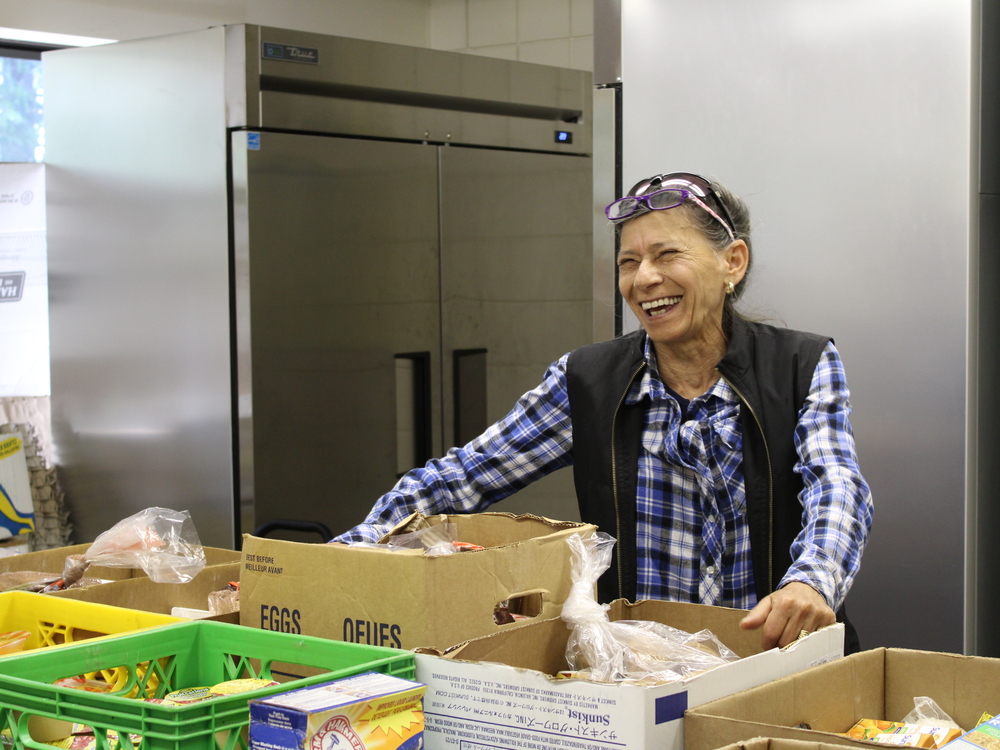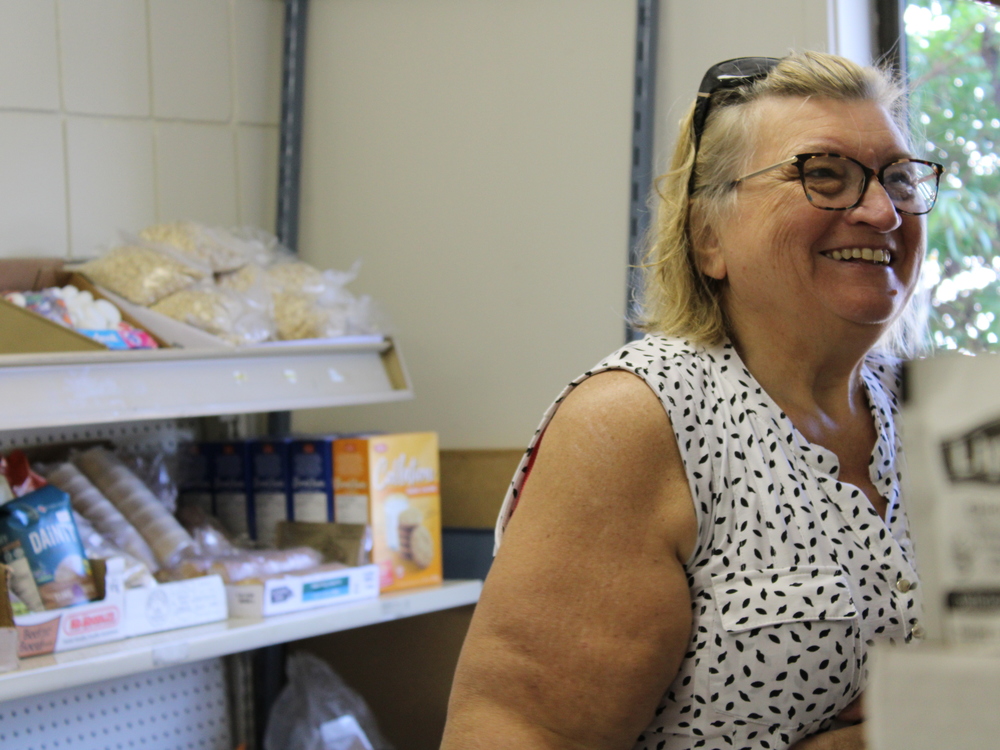
It takes a village. Here. For fuller hearts & plates.
A secluded community
A winding, picturesque road weaves its way into the village of Gold River; the mountains and lakes of the provincial parks shoulder the highway that leads the way from Campbell River as the natural beauty of Vancouver Island ushers you into the community.
Tucked in the forest, Gold River once housed two mills that drove the local economy. Today, one mill is shut down and the other has cut back on production, resulting in more layoffs. The impact has been noticeable on the village, including that the primary grocery store shut down a few years ago and still remains empty. The smaller grocery store that opened last year is also now closed. When it comes to food supply, the residents of Gold River have few options.
Those with reliable cars can drive an hour and a half to Campbell River, the closest major centre, but in the winter that drive becomes treacherous. Many rely on the remaining local Deli and others are dependent on a delivery service that takes the trip to Campbell River on the residents’ behalf. Increasingly though, more individuals and families are relying on the Gold River Food Network.
Nourishing communities through food security
“When we think about food security, we also have to think about what we call the household food security, which is actually the ability of individuals or families to be able to afford and access all the food that they would choose for their family to have on the table,” says Alžběta, Director of Food Security for United Way British Columbia. “So when we talk about food insecurity, it’s the inability of those people to do so.”
United Way BC’s Food Security initiatives work to ensure British Columbians have access to nourishing, healthy, and culturally appropriate food. Regional Community Food Hubs are an innovative and local response to food security. Strengthening a sustainable food security system for British Columbians requires everyone working together, united to achieve change.
Alžběta’s passion about food security shows through when she discusses United Way BC’s key role in developing and supporting hubs. “We are looking for the most efficient and adequate solution to support local or regional communities where they’re at with what they need. We are a partner in terms of getting all the partners to work together, and collaborating to come up with solutions that are sustainable, efficient, and support or address some of the inequities that are happening in the food sector.”
It takes a village
The Gold River Food Network is the result of many partners collaborating to support the community in its food needs. This network includes the Strathcona Community Food Hub, funding from United Way BC, the Village of Gold River, volunteers from the Seniors Centre, donors, students helping assemble hampers, corporate donors, and countless village residents working to support one another. Many hands make this work possible.
“The Strathcona Community Food Hub is a joint coalition model that is essentially made up of organizations that are driven to collaborate on food security initiatives across Strathcona region,” enthuses Madison, Coordinator for the Strathcona Hub. “We work with communities far and wide, like the First Nation of Cortez Island, Quadra Island, here in Gold River, Tahsis, Campbell River, and many others in the valleys.”
She smiles when she discusses the network of support, “Here in Gold River, they’re offering food hampers and a food bank, but that wouldn’t be possible without the connections from other agencies like Loaves and Fishes out of Nanaimo and Saint Vincent de Paul, as well as United Way.”

An advocate for building networks for sustainable food security, Madison has worked with communities across Strathcona region.
For example, groceries collected through food recovery in Nanaimo make their way to Gold River once per month to support their hampers and food bank. The Village of Gold River supports the program with space for the food bank and office, as well as affordable rent for the storage room.
Nurturing food hubs
The storage room is filled with boxes, food products, and the laughter of volunteers as they prepare hampers. In the corner are two large fridges that have had an important impact on the program.

The ladies of Gold River Food Network volunteer their time to create hampers and stock the shelves of the food bank. Their laughter permeates the halls and welcomes everyone into the space. [L-R: Carole, Mary, Maeve]
“Now we have fridges and freezers where we’ve got dairy, milk, butter, eggs, meat, fresh vegetables, frozen vegetables. We’re able to give them a lot healthier food than what we were able to do previously because we had no refrigeration,” says Marcie, Coordinator of the Gold River Food Network. Her eyes light up when she speaks, excited that they can offer more options.
As she explains the balance between supplying both the food hampers and the food bank, volunteers have a friendly debate about what items will go into the hampers. “Last Friday was our hamper day,” says Marcie. “We handed out 24, so those people won’t access the food bank this week because they’ve already got it. The week after we hand out hampers is set aside for the people who didn’t get one, so they have a chance to access the food.”
While they try to cap the number of food hampers at 24, there have been times when they’ve increased that number, sometimes up to 32. As Marcie says, “There was just such a need. When we have an abundant supply, we will go a little higher in our numbers.”
This work is beautiful, but the need for it is sobering.
Caught between a rock and a hard place
For Christina, accessing the food network has been vital. “I’ve been using the food network on and off for about three years. You never expect to have to use facilities like this, but it’s good when they’re here that you can.”

Taking care of her two “big, healthy boys” is important to Christina. The accessibility of the Gold River Food Network is something she appreciates.
Christina is the type of person who accepts life’s challenges with resolve and a matter-of-fact attitude. She and her husband moved with their two boys and pets to Gold River from Nanaimo in search of affordable rent. Since moving four years ago she has enjoyed the outdoor life with mushroom picking, fishing, and exploring the trails with her sons. She laughs when she recounts how all of her photos of her sons are of them exploring the outdoors. They are her priority, and she does whatever she can to make sure they are safe and happy.
“It’s good,” she says about living in the village. “It’s secluded, but it being secluded can also trap you in a town. Like, if you don’t have a vehicle, you can’t get out. There’s no busses so you ask friends or go on social media.”
It’s a difficult compromise when finding an affordable place to live means less accessibility to essentials, like food. For the most part, Christina can find everything she needs in Gold River. “Basically, most of the necessities are here. The prices are a bit more compared to out-of-town, and usually, it’s the smaller stuff, like not a full-size bag of potatoes. The bigger stuff you want for families isn’t here.”
Medical issues for both her husband and son have placed extra pressure on Christina and her family. Inflation and gas prices mean extra costs. “There’s been a few times where absolutely we needed to come here just to get a few things.”
Luckily, the ladies at the food network make the experience a pleasant one. Chistina chuckles and describes them as “awesome”. “They always have a smile on their face, and they’re very helpful. I like to come and visit; try to put a smile on their face.”
Sustainability in Food Security
Food security and food sustainability mean different things to different people. For Christina, it means providing food consistently for her family.
As Marcie also comments, “Food security to me means being able to access it readily and being able to afford it. Getting food is the biggest thing, so the more we can help people feel more secure in the fact they can get food is what we look for.”
United Way BC’s 20 Regional Community Food Hubs are one meaningful step toward sustainability. “It’s looking at addressing some of the power dynamics and the challenges that we’ve seen and the cuts in the system of how and where people access food,” says Alzbeta.

With her laugh and smile that puts people at ease, Marcie takes on her job as Coordinator at Gold River Food Network with humility. She is quick to point out the hard work of others and the pride she feels at the support, “With all the help we have and the volunteers we have, you couldn’t ask for better.”
When it comes to a regional approach, Madison comments, “Food security initiatives look different in different communities. It can be community gardens, food literacy programs, and community meals. We also put a strong emphasis on Indigenous food sovereignty and want to see them have access to health meals all through the year.”
For the Gold River Food Network, sustainability is stocked shelves. “That’s my worry,” says Marcie. “My ladies worry about what is going to make a really good hamper that covers all the food groups. Mine is more financial – what will keep us going.”
Keeping the food network functional has its challenges. “Number one right now is access to enough food. Everything’s getting more expensive, and the stores are ordering less so they’ve got less to donate. To keep stock in, we have to do out of town shopping and bring it back. The other challenge is getting the product here. There’s always extra trucking costs. There’s always some little thing but we persevere,” Marcie says with a smile. The pride she has for her volunteers and community shine through when discussing finding solutions to any challenges.
Hubs bringing together communities
It’s the challenges that see the community come together. It’s also where the hub becomes a focal point for addressing food security in the village.
“We donate to a few places,” says Marcie. “The daycare for their kids, other entities in the town that we can help, we will. In turn, they help us out, which helps the clients feel more secure with being able to access food.”
One such group that help the network is the local high school. “Students come whenever they’re in school on a Friday. They help with the orders, restock the storeroom and rotate all the stock. They fill all the shelves and in exchange they get their extra credits. We then support their foods program because they have little funding for that.”

Volunteers balance the needs of the food hampers with the food bank. Carole checks the shelves and ensures its ready for the next day.
The sense of community, standing together, is something Christina also mentions, “It’s great. If something were to happen and the community knew about it, it helps out. They totally pull together when needed.”
It’s also something central to United Way BC’s food security initiatives. As Alzbeta says, “We are really working closely with those partners to destigmatize what food access means to people and to actually use food as a vehicle, to build communities, to bring traditions around food, to build and foster healthy, caring communities locally, regionally and even on the provincial level.”
Connected Communities
Gold River is notable not only for its secluded beauty but, more importantly, for its strong community that pulls together so that everyone can thrive. Yes, there are challenges, but the determination and passion from individuals and agencies is the best chance for food security to be sustainable.
The support of United Way BC’s Food Security Initiative | Food Hubs is vital in ensuring hubs, like the Gold River Food Network, continue to meet the needs of community members. Through funding to the Strathcona Community Food Hub and its interconnectivity, communities rely on one another and provide aid when they can.
Marcie sums it up nicely: “We really understand it now. It really does take a village. It takes everybody to keep things going.”
Let’s be here. For each other. Donate today. For tomorrow.